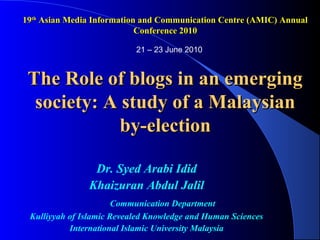
The role of blogs in an emerging society
- 1. 19th Asian Media Information and Communication Centre (AMIC) Annual Conference 2010 21 – 23 June 2010 The Role of blogs in an emerging society: A study of a Malaysian by-election Dr. Syed Arabi Idid Khaizuran Abdul Jalil Communication Department Kulliyyah of Islamic Revealed Knowledge and Human Sciences International Islamic University Malaysia
- 2. Outline Introduction Research Question Democratization of Information Blogs and elections Elections in Malaysia By-election Methodology Findings & Conclusion
- 3. Introduction Exponential growth of blogsphere worldwide – Technocrati Medium of political participation – shape the democratic process in the country Lack of empirical studies
- 4. Research Questions What is the role of bloggers during the by- election? What issues are raised in the blogsphere during the by-election? Do blogs play the same role or a different role from the conventional media during elections?
- 5. Democratization of Information Pangloss, Pandora or Jefferson? (Benjamin R. Barber, 2006) Blogging in Malaysia – leveling the political field Democratic participation
- 6. Blogs and elections • 2004 • Political blogsphere in Malaysia is expanding • Strengthened by prominent figures (bloggers) such as Tun Dr Mahathir Mohamad, A.Kadir Jasin, Jeff Ooi, Lim Kit Siang, Anwar Ibrahim
- 7. Elections in Malaysia: General election Parliamentary form Democracy with Constitutional monarchy. General Election every 5 years to elect: – House of Representatives (Parliament) 222 seats – State Legislative Assemblies (each state except federal territories) 576 state seats
- 8. Elections in Malaysia: General election 27 political parties in Malaysia 15 in Peninsular, 7 in Sabah & 5 in Sarawak National Front (BN) is a coalition of 14 political parties headed by United Malay National Organization (UMNO) BN had won every single general election since Malaysia’s independence
- 9. Elections in Malaysia: by-election By-election – vacancy in state / parliamentary constituency due to death, resignation , disqualification or other causes if it occurred before the Parliament or all State Legislatures are due to dissolve. This study focused on the Pengkalan Pasir, Kelantan by-election on 6 December 2005
- 10. N12 Pengkalan Pasir, Kelantan Stronghold of Pan-Malaysian Islamic Party (PAS) Poor district, voters mainly farmers and small traders Majority of voters are Malay (94.8%) Chinese voters (5.09%) Indian voters (0.3%) other races (0.1%) Half of the voters are women (50.18%)
- 11. Methodology Quantitative Content Analysis Keyword sampling method 75 active blogs 5 categories: – Nationality of bloggers (2 categories) – Blogger’s support (4 categories) – Issue discussed (8 categories) – Field of blogs (5 categories) – Language (3 categories)
- 12. Findings: 1 November 2005 to 11 December 2005 Bloggers’ nationality and support. Malaysians or Local (97%, n=75) Nearly half support PAS (44%) Non-partisants: – Professionals (16%) – Neutral (27%)
- 13. Figure1: Bloggers political support During the Pengkalan Pasir by-election Campaign 70% 60% 50% 44% 40% 30% 27% 20% 16% 13% 10% 0% BN Opposition Non-partisan Neutral Professional
- 14. Findings: Issues discussed – 42.7% on election issues e.g. state of Pengkalan Pasir. – 18.7% on information on the election. – 14% BN issues – 10.7% opposition issues – 4% issues related to democracy Islam dissatisfaction with election result – 1.3% on corruption
- 15. Findings Field of blogs – 80% commentaries – 9.3% referral to political party websites. – 6.7% chatting. – 2.7% reference to mainstream media. – 1.2% broadcasting.
- 16. Findings Languages used by the bloggers were divided into three categories namely unilingual, bilingual and multilingual
- 17. Findings Language Unilingual – 45% Malay – 41% English – 1% Arabic Bilingual– 9% English & Malay Multilingual 3%
- 18. Figure 2: Language used. Bilingual Multilingual 9% 3% Arabic Malay 1% 46% English 41%
- 19. Conclusion BN won the by-election despite stronger support for the opposition in the blogsphere – Hanafi Mamat (BN) won with a majority of 134 votes – Hanafi Mamat won 7,422 votes defeating Hanifa Mat Yatim 7,288 votes. Independent candidate, Ibrahim Ali polled 415 votes. Malaysian bloggers dominated the discussion. Malay and English languages were equally used.
- 20. Conclusion 50% of the bloggers remained neutral in their political comments. The other half are mainly supporters of PAS. Generally the opposition parties and their supporters seem to utilise the blogsphere more than the ruling party
- 21. Conclusion Election issues such as those on election campaigns, election process and political party (BN and opposition) are among the top issues in the blogsphere. Issues discussed were not directly on the voters’ concern rather covered a wider public perspective.
- 22. Conclusion Itwas found that the political blogsphere opens up an avenue for public discourse that do not directly involve the voters. Blogs cannot operate in isolation. Stronger support for the opposition online do not translate into votes in the by- election.
- 23. Thank You
